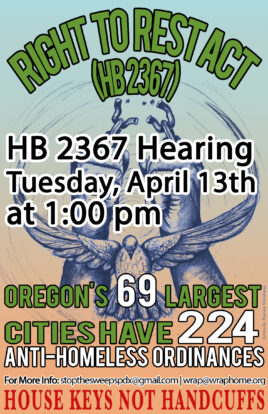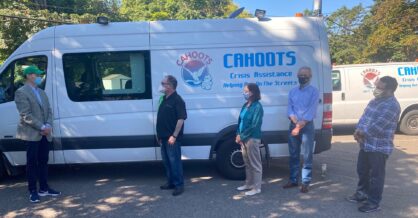
Racism is a Public Health Crisis
A Statement from CAHOOTS
Written by Ebony Morgan
CAHOOTS Crisis Intervention
Communications Team
Cahoots has been operating as a mobile crisis intervention program in Eugene since 1989. We respond in teams of two with a medic and trained crisis worker, handling 20% of the 911 calls in our area last year. This is a responsibility we take extremely seriously, and we feel privileged to do this work.
Across the nation, communities are demanding that elected leaders defund police, reallocate resources, and re-evaluate current approaches to public safety. As the first program of our kind, we are in a unique position to share our experience and knowledge with other cities that are now considering alternatives to policing. We are humbled by this and have become acutely aware of our privileged position within a system designed to oppress.
At our roots, Cahoots is innovative, forward-thinking, and dedicated to serving marginalized populations. Despite this, we are not immune to the effects of systemic racism and if we are going to lead by example, we must first do the work internally. We take responsibility for our past silence, and we commit to being advocates for change. We are actively seeking out, evaluating, and eradicating the ways that white supremacy exists within our structure and we encourage other organizations to do the same.
Cahoots proudly stands with Black Lives Matter. We believe it is not enough simply to disapprove of racism. Rather, we assert that individuals, organizations, communities, and the nation as a whole have a responsibility to be anti-racist. We will speak up when we see power inequities. We will amplify oppressed voices. We will continue to educate ourselves. We will not shy away from any aforementioned commitments due to potential risks. We will reflect regularly and welcome feedback as we learn to use our privilege constructively.
We are appalled by the lynching of George Floyd, aware that he was not the first nor the last to die a preventable death due to the color of his skin. Police brutality is not an isolated issue. It is a symptom of the broader toxic culture of white supremacy that was woven into the fiber of this nation as we know it during its inception.
Racism is a public health crisis. For the sake of health equity, we have a responsibility to dismantle systems of oppression. This will take a lot of effort and we will have to be intentional about addressing racism’s effects on the social determinants of health. We must begin this work immediately.



